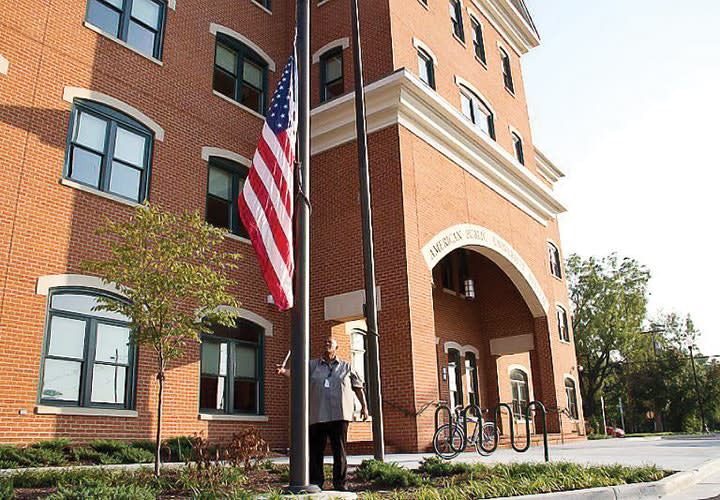The field of law enforcement is becoming ever more complex, and universities' offerings are evolving to keep pace with these changes.
Today's continuing education offerings for law enforcement provide more than just a flexible schedule in an online environment and strictly academic coursework. Universities recognize that modern policing also requires instruction that is directly applicable to the job, and that job encompasses a wide range of ever changing and increasing skill sets.
"Traditionally, law enforcement education has always been about getting the bachelor and master's degrees in criminal justice or public administration so they're prepared to be administrators as they move up the ladder. But that all changed with 9/11," says Dr. David Thomas, PhD and lead faculty for the masters in criminal justice at Columbia Southern University. "You can't just focus on policing, but also homeland security. They have to be much more diverse in their course selection because the world has changed so much."
Now law enforcement officers must be ready to handle large-scale events, and also be willing to enter a hot zone without waiting for SWAT or even backup in active shooter situations or similar incidents. For these reasons, counter-terrorism, counter-intelligence, cybercrime, and emergency management are now in-demand degrees for law enforcement officers.
This shift in thinking involves working more closely with firefighters and other emergency responders in training and on the job. Thomas says this has led Columbia Southern to require firefighters and police officers to take courses about how each other functions so they know how to collaborate during critical incidents. "Law enforcement and firefighters have always been in our own worlds and we haven't played well together, but we need to in order to serve the public," Thomas says. "You can't do it any other way."
This is just one example of how education for law enforcement is adapting to changes in policing.
To meet officers' needs, faculty regularly re-evaluate their curriculum and update it. This involves not just adding references to recent incidents and police response to reflect current events, but also sometimes adding complete degrees or other courses of study in emerging law enforcement disciplines, as well as reworking more traditional programs to include new focuses. The field of law enforcement is becoming ever more complex, and universities' offerings are evolving to keep pace with these changes.
Leadership
While the world is changing, some fundamentals remain. That includes the need to train tomorrow's law enforcement leaders. "The leadership piece is a permanent cornerstone of law enforcement education," says Jeff Kuhn, associate vice president at American Military University. "Any law enforcement executive will tell you preparation for leadership is an important part of becoming executives at some time in their career." This is why every university providing law enforcement degrees continues to offer this type of instruction.
The way in which officers obtain leadership skills through formal education does not remain the same, however. In fact, the University of San Diego has developed an entirely new degree program tailor made for law enforcement officers seeking leadership positions. It is called the Law Enforcement and Public Safety Leadership M.S. As the program's academic coordinator, Dr. Erik Fritsvold, Ph.D., worked closely with officers to determine what type of coursework and instruction would benefit them. They all said what they needed was law enforcement-specific leadership training.
"Because of staffing shortages and retirement and other demographic shifts, agencies are being forced to more quickly promote officers than they would have two decades ago," says Fritsvold. Which makes this type of instruction more desirable than ever.
To make the University of San Diego's new degree program as useful as possible to its law enforcement students, it was designed in a decidedly non-traditional way for this traditionally brick-and-mortar academically centered school. "Our guiding principle is we want a skills-based program that focuses on applied content. We have zero tests," says Fritsvold. The first students are currently in the middle of the 20-month program, and Fritsvold says the feedback he has received for the content and type of instruction has been overwhelmingly positive.
Alternative Ways to Gain Knowledge
Online instruction has become the norm for law enforcement officers because of the flexibility it affords them. They can complete assignments and engage in discussion working around their schedules. Now, more methods of instruction better suited to law enforcement are becoming available.
"We're seeing better and better online classes in terms of structure. They incorporate video and audio clips in addition to live streaming," says Troy University's Rush. This allows officers to react to incidents on the nightly news and discuss how they would respond, in real time in many instances. This sharing of ideas among students is often where the most learning occurs.
Biddle of Stevenson University agrees. "Instructors are able to create a virtual classroom so even if students are at home or work they feel like they are in the class and able to converse in a live environment," he says. "The number of ways to communicate are endless, including PowerPoint, video, live chat, and discussion boards."
The degrees themselves are changing as well. Concentrations within more traditional degrees allow officers to utilize these virtual classroom tools to deepen their knowledge in areas of importance to them, without tacking on an additional lengthy program.
"Cybercrime is a newer degree offering, but some that sound like they've been around for awhile actually have evolving concentrations in them, which are driven by current events," says Kuhn of AMU. This makes these seemingly traditional degrees "new" and all the more valuable to officers and the agencies that employ them.
Another avenue for law enforcement education is through certificate programs. An officer can obtain the necessary skills to help his or her agency without the commitment of time and resources needed for a full degree. "A certificate program is a much more practical approach for someone who wants to gain an educational advantage in a year to 18 months, versus a degree that takes four years," Kuhn says of AMU's offerings.
For example, American Military University offers certificate programs in areas such as homeland security, information technology, and intelligence. To obtain a certificate in a certain discipline, a student must complete six three-credit courses that address that topic, at the graduate or undergraduate level.
Emerging Trends
No one would argue the point that police officers need to constantly upgrade their skill sets. To this end, universities are working to provide instruction in up and coming fields of study, in addition to updating curriculum for law enforcement education mainstays.
"You can't say, 'I was trained on this 20 years ago and that's sufficient.' It's not," says Dr. Christopher J. Biddle, adjunct professor at Stevenson University. "You need to stay current with what's going on in our society." He points to the recent trends in demand for ethical reform and changes in use of force protocol and what he refers to as "ethical reforms," as well as the public increasingly challenging officers both physically and verbally. "Officers today need to understand the moral, social, and psychological make-up of groups, and how to deescalate situations," Biddle says. And he sees more interest in courses that provide these necessary skills.
Some of the fields of study available to law enforcement are just now becoming available because of expressed interest in them.
Health is a major area of education becoming of more interest to law enforcement going forward, according to Jeff Kuhn of AMU. "I think you're going to see more of a focus toward things like public health and wellness, dealing with officer stress and resiliency," he says. "There's a great demand for not just training but formal education in these areas for people to really help law enforcement officers cope with the job." American Military University offers health and psychology courses.
Media relations is another area of study that is of growing importance to law enforcement, as the public seems to expect agencies to communicate immediately and often regarding any noteworthy incident that might be considered news. "We built instruction on media relations into our communications course," says the University of San Diego's Fritsvold. "I frankly will have to revise our curriculum every six months to make sure we're continually meeting our students' needs, but I think this will be a mainstay for years to come."
Along the same lines, Columbia Southern University's Thomas sees juvenile justice and disparities in the treatment of minorities as topics that will continue to gain steam, and expects that more courses will be made available for law enforcement officers to study them.
Data analysis and intelligence-led policing will continue to be important areas of study for law enforcement, says Fritsvold. He recently developed the data analysis course for the Law Enforcement and Public Safety Leadership M.S. as part of its community assessment instruction. It focuses on using intelligence-led policing to do more with limited resources and under high public scrutiny.
Social media is another newly essential component of police work. "We're doing investigations almost exclusively in social media in some cases," says Troy University's Dr. Jeff Rush. "We teach social media as part of our digital forensics coursework, but some institutions teach it as part of cyber security, or just a standalone class." Rush believes the fact that this one topic fits into so many aspects of criminal justice speaks to the interdisciplinary nature of modern law enforcement.
"The future of law enforcement is changing, faster than it used to in many ways, and all of these fields have interconnectedness that we haven't seen before," says Rush.
Making Your Education Work for You
Universities are now offering more educational opportunities in these interconnected subject areas that matter most to law enforcement, and many officers are taking advantage of the specialized instruction available to them to help them excel at their jobs, now and in the future.
"I think the trend is more professional and better educated cops and supervisors and administrators. And I think that will only increase as time goes on," says Rush of Troy University. He believes more agencies should recognize this and make use of these highly skilled and educated officers so they won't leave to join other agencies that appreciate what they have to offer. But the reality is that having in demand skills gives you more opportunities to seek new positions within and outside of your agency.
"I think the degrees are a gateway," says Columbia Southern University's Thomas. "They are your pedigree and the ticket to get the door open. It's what you do with it from that point on."












